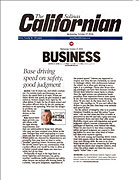Integrity Matters
October 27, 2004
Base driving speed on safety, good judgment

 Question: (E-148)
Question: (E-148)
Dear Jim:
I am 16 years old, and adults confuse me. On certain
roads and freeways, as you know, the speed limit is 65
mph. When my father drives that speed, he gets honked
at and yelled at. Drivers simply blow right by. He often
drives 72 mph (in the 65-mph zones) and the police officers
drive by his car, paying no attention to his speeding.
Who has the integrity problem: my dad, the other drivers
or the police?
 Response:
Response:
Speed limit signs provide you and others with the legal
driving requirements, and they are enforceable, by those
very officers who may not have stopped your father in
the past. Perhaps they were responding to a non-crisis
call which did not require lights and sirens. When police
officers are directed by dispatchers to act promptly,
they may have no time to write “routine” speeding
tickets. However, and for the record, based upon my conversation
with a police officer, you would be wise to drive at
or below posted speed signs, not once in a while, but
all the time.
Technically, 65 mph is the legal limit on many highways
and freeways, but, given weather conditions, traffic
patterns and safety, other factors can reduce safe driving
limits. In a phrase, “use good judgment, regardless
of the posted speed.” Drivers are expected to respect
and obey the law. Definitely, no one is to endanger others
with recklessness behind the wheel. As is often said,
driving is not a right, it is a privilege. Those who
abuse driving privileges can have their licenses revoked.
Should their behavior cause harm to others, then the
legal system can administer harsh penalties, from expensive
fines to time spent in jail. You may remember some rhyming
wisdom: “If you can’t afford the dollars
to pay the fine, then keep your attitude and speed in
line.”
On the subject of integrity, who is in possible violation?
Possibly, no one! My police “counselor” told
me that when the flow of traffic is perceived as smooth
and safe, a grey area may be tolerated. Rules and laws
that offer some flexibility, based upon self-regulation
and good judgment, afford a mature community the privileges
of freedom, even behind the wheel. What we also know
is that when courtesy, safety and good judgment are central
to driving habits (or most any other kind of behavior)
then trust replaces rigidity.
So, for now, young and learning driver, watch your
own speed, follow the law and improve your own driving
skills. Be sure to let your father know you are observing
his driving and that you know that integrity
matters, even when the police might not have the time to legally “ticket” him
- yet.